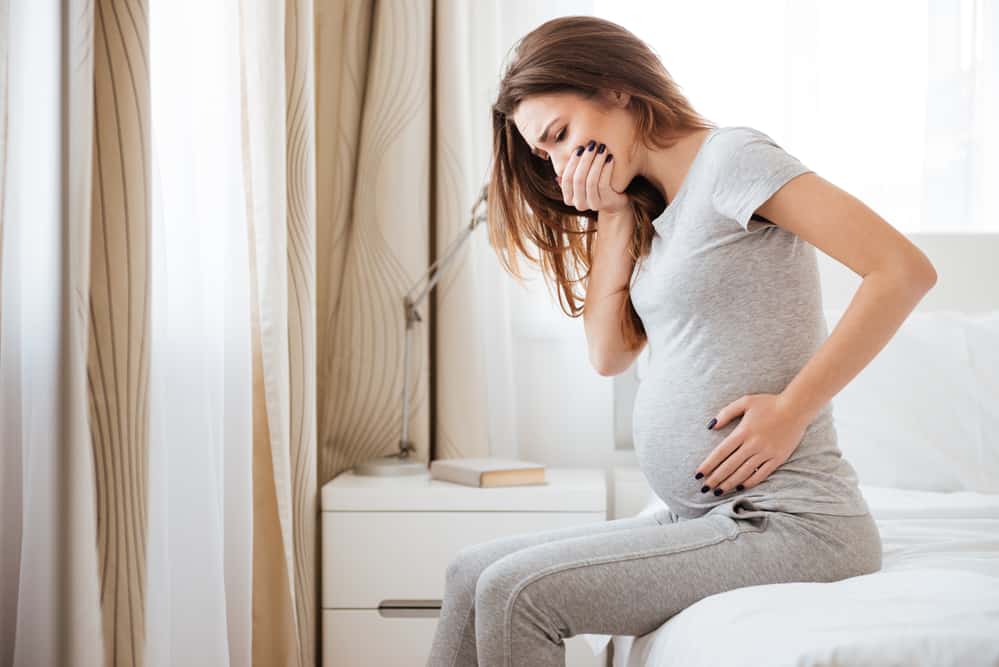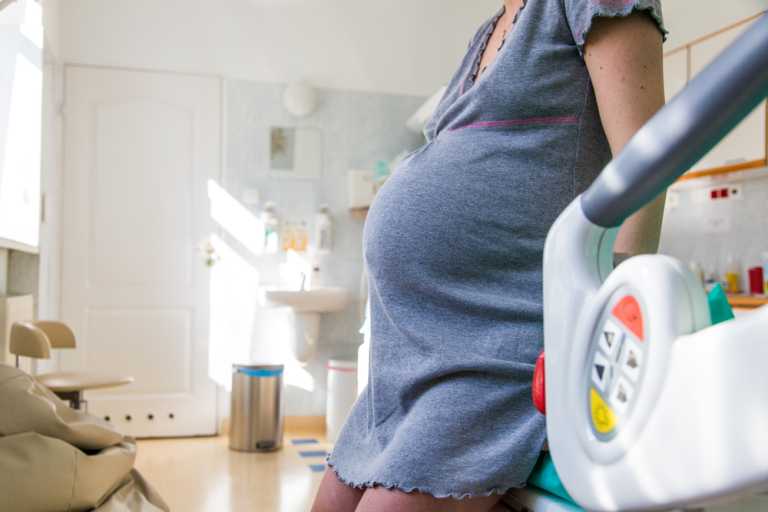Nausea appears on almost every list of early labor signs out there. So, if you’re more than 38 weeks pregnant and start feeling sick, it’s tempting to think you’re just a day away from newborn cuddles.
Unfortunately, while some women do experience nausea before labor, many more feel sick for other reasons. A few of these could leave you nauseous for weeks.
Is Nausea an Early Sign of Labor?
Nausea in your third trimester could be an early sign of labor. If it’s accompanied by diarrhea and the loss of your mucous plug, you could be just 24 to 48 hours away.
However, before you get too excited, labor isn’t the only cause of late pregnancy nausea. Here’s a list of the potential culprits:
Labor
When labor is imminent, your digestion will shut down, so your body can focus on giving birth. If you have a full stomach, this could trigger nausea or vomiting. Diarrhea is common too. Oh, the glamour of birth!
Hormones
Your levels of the hormone progesterone will peak around 32 weeks. This is great for your pregnancy as it prevents pre-term labor. Unfortunately, it also relaxes your bowel muscles, slows digestion, and triggers nausea.
Anxiety
Stress or worries about your impending labor could cause you to feel a little queasy. Try relaxation techniques or talk to your healthcare provider about your fears.
Prenatal Vitamins
If you’ve recently changed supplements, this could be the source of your sickness. Ones with high iron are particularly bad for nausea. Talk to your doctor about switching to something that won’t upset your stomach.
Lack of Space
As your baby grows, your uterus expands and puts pressure on your stomach and intestines. This can cause heartburn for 60%, nausea for 16%, and vomiting for 7% of women in their third trimester.
Vomiting Bug
If you have absolutely terrible timing, you might pick up a vomiting bug in your third trimester. This is more likely if you know someone else who’s been sick or you have a fever. Fortunately, it should pass on its own. But, if you can’t keep any liquids down, seek help. Dehydration can trigger pre-term labor and could complicate your birth.
Pre-Eclampsia
Pre-Eclampsia is a high blood pressure condition that affects around 1 in every 25 pregnancies. Symptoms include nausea, vomiting, headaches, changes in vision, pain in the upper stomach, and swelling of the face and hands. The condition requires medical care, so seek help if you have these symptoms.
HELLP Syndrome
Hemolysis, elevated liver enzymes, and low platelet count, or HELLP syndrome, is a rare liver and blood clotting disorder. It affects less than 1% of births and usually appears between 32 and 34 weeks. Symptoms to look out for are pain in the upper right chest area, vomiting, nausea, headaches, and visual disturbances. This condition requires urgent medical care.
Liver Issues
Very rarely (1 in 20,000 pregnancies), nausea could be a sign of Acute Fatty Liver of Pregnancy or AFLP. The key symptoms are vomiting, abdominal pain, and jaundice. It’s considered an emergency. So seek medical help if you suspect this is the cause of your sickness.
The most important thing is to listen to your body. If you feel something is wrong, arrange a blood pressure check and urine test. These are quick and simple, and your healthcare provider will be happy to put your mind at ease.
How Long Does Nausea Last Before Labor?
If your nausea is a symptom of early labor, it may resolve as soon as your stomach is empty. However, you could also feel sick or even throw up throughout your delivery.
Unfortunately, nausea is not a great indicator that your baby will arrive any time soon. It could stick around for weeks if issues like a lack of space or hormones trigger it.
Sickness related to a medical condition should resolve with treatment.
What to Do if You Experience Late Stage Nausea
If you experience nausea or vomiting during your third trimester, you already know what to do. It’s time to revisit your morning sickness coping strategies.
Things that can be helpful include:
- Eating little and often.
- Staying hydrated with water.
- Drinking ginger tea or eating ginger cookies.
- Peppermint oil aromatherapy.
- Avoiding acidic, fatty, or spicy foods that could trigger heartburn.
- Adjusting your prenatal vitamins. Changing the timing, splitting the dose, or switching to a gummy could all help.
If you’ve tried everything and you’re still struggling with nausea, visit your doctor. There are a few different anti-sickness medications that you can take during pregnancy.
How to Treat Vomiting in the Third Trimester
If your nausea progresses to vomiting and you struggle to keep fluids down, seek medical help. Dehydration in your pregnancy could lower amniotic fluid levels or trigger pre-term labor. Both of which could result in complications for your baby.
A doctor can prescribe an antiemetic, or IV fluids.
How to Treat Nausea and Vomiting During Labor
It’s also common for women to vomit throughout active labor. In some cases, it’s triggered by contractions or hormones. But it can also be a side effect of pain medications.
It’s not usually an emergency but could cause you to become drowsy or dizzy. Not an ideal state for giving birth.
Try to maintain hydration throughout your labor. Do this by drinking small sips of water or sucking on ice chips or ice lollies. Your stomach will absorb small amounts even if you feel like you are bringing it all back up.
Also, try to eat or drink something to keep your energy levels up. Yogurt, toast, or muesli bars will help fill your stomach and could relieve your nausea.
Diluted apple or pear juice will also boost you without being too acidic if you can’t handle solid food.
FAQs
Yes, lots of women experience nausea during labor and many vomit. This can be due to your body clearing your stomach, the intensity of contractions, or anxiety. It might even be a side effect of pain relief.
Yes, nausea could be your first sign of impending labor. But it’s just as likely due to hormones or your baby squashing your bowels. Wait until you’ve experienced a more reliable sign before getting too excited. These include losing your mucous plug, lower back pain, and your waters breaking.




